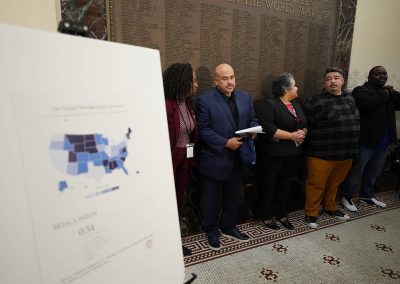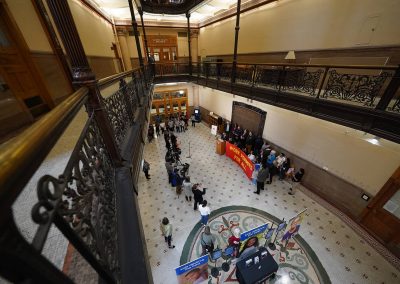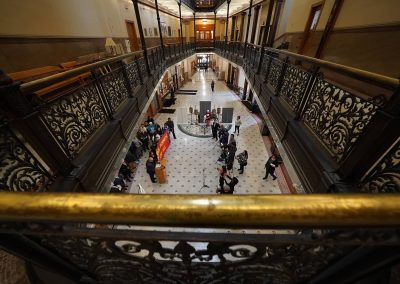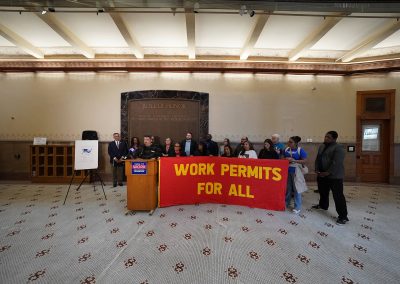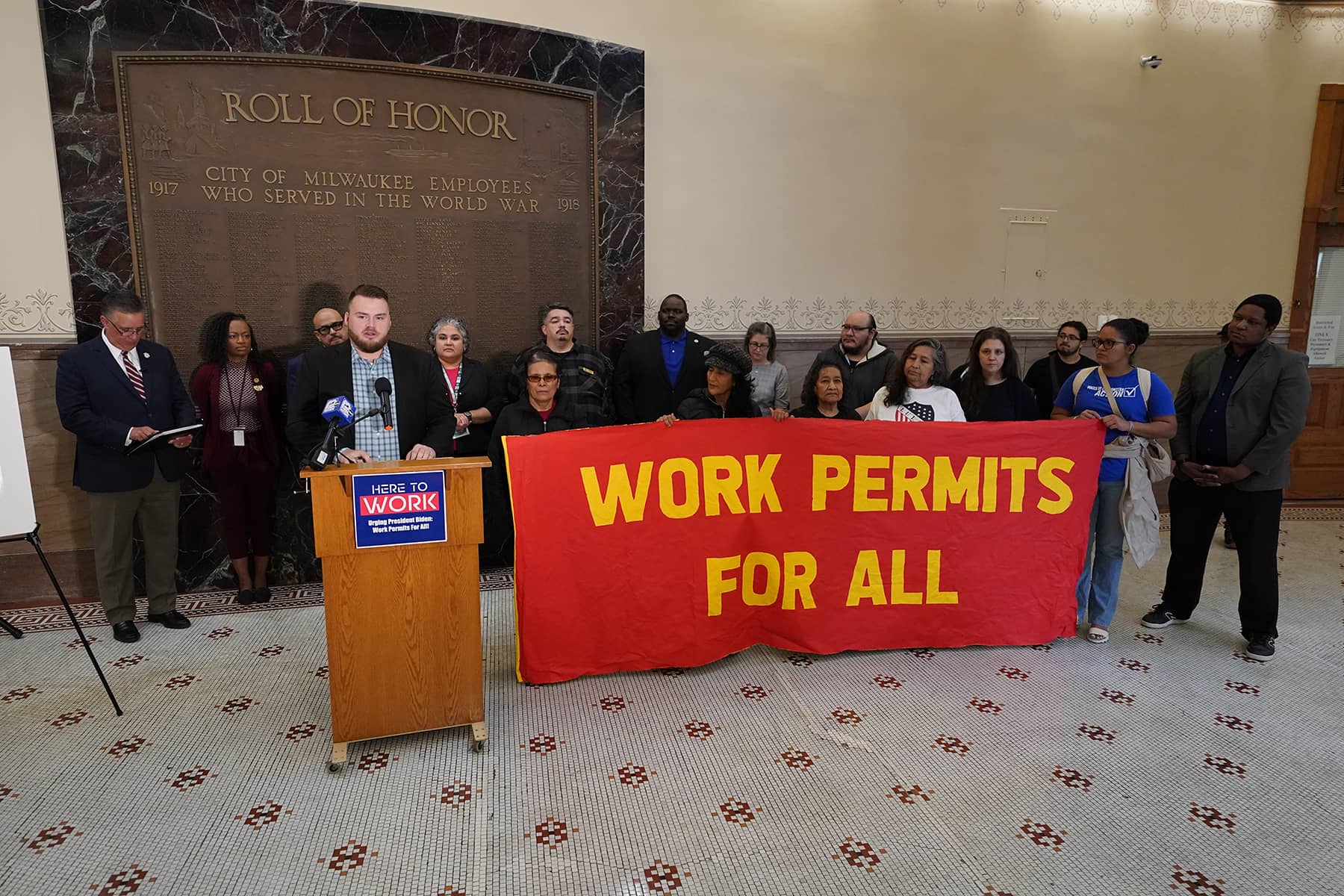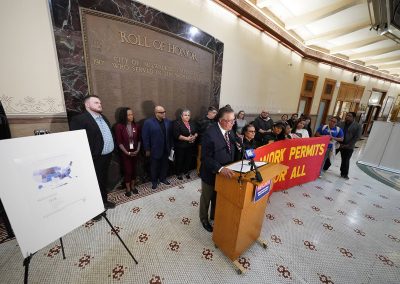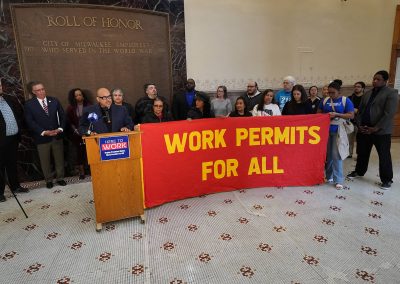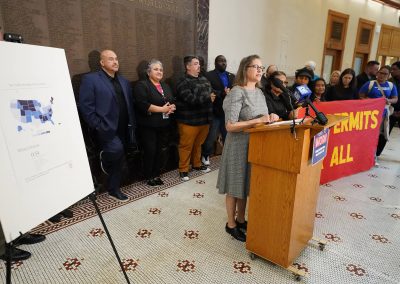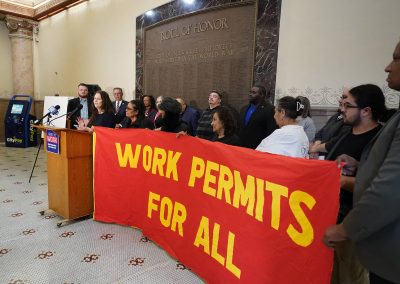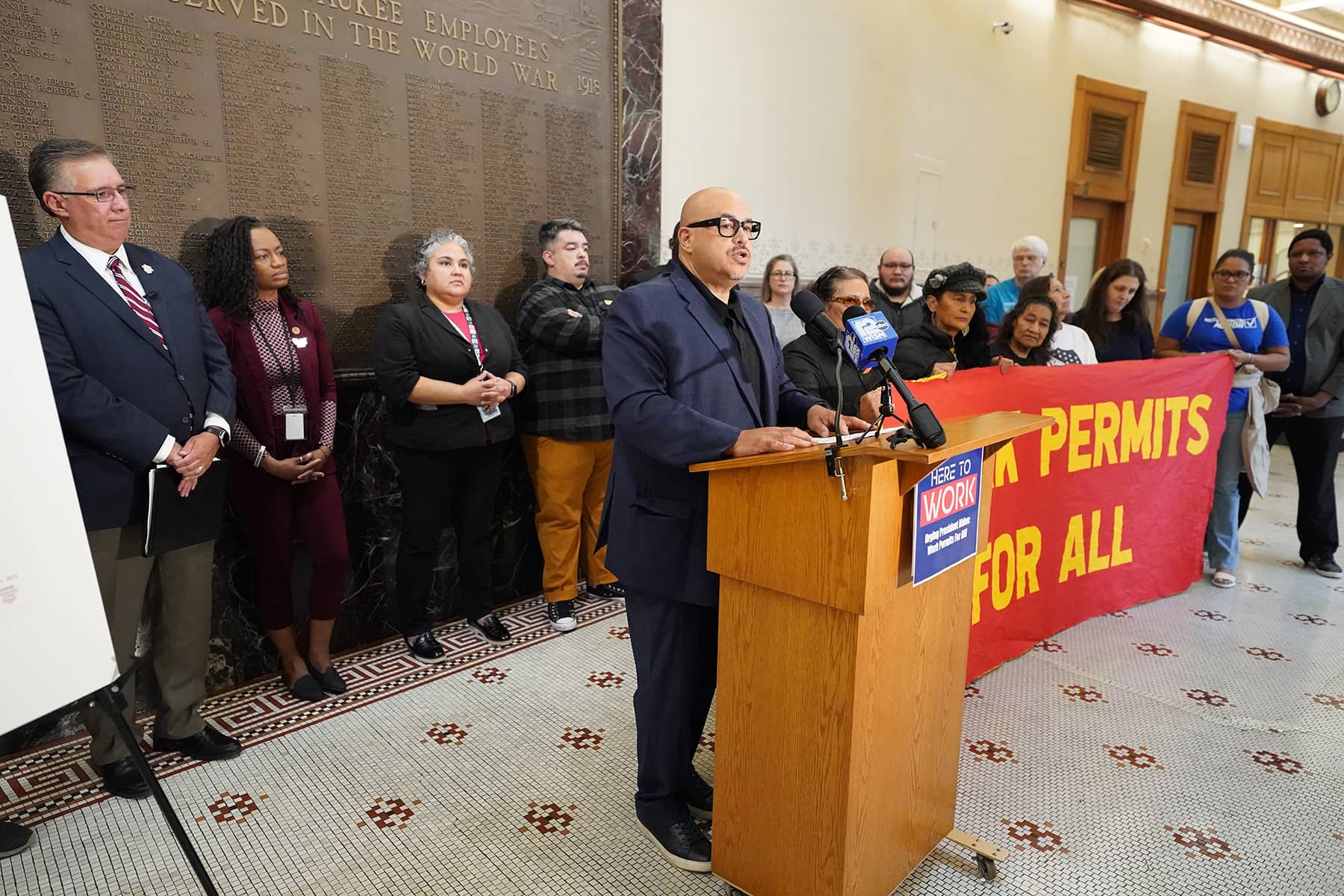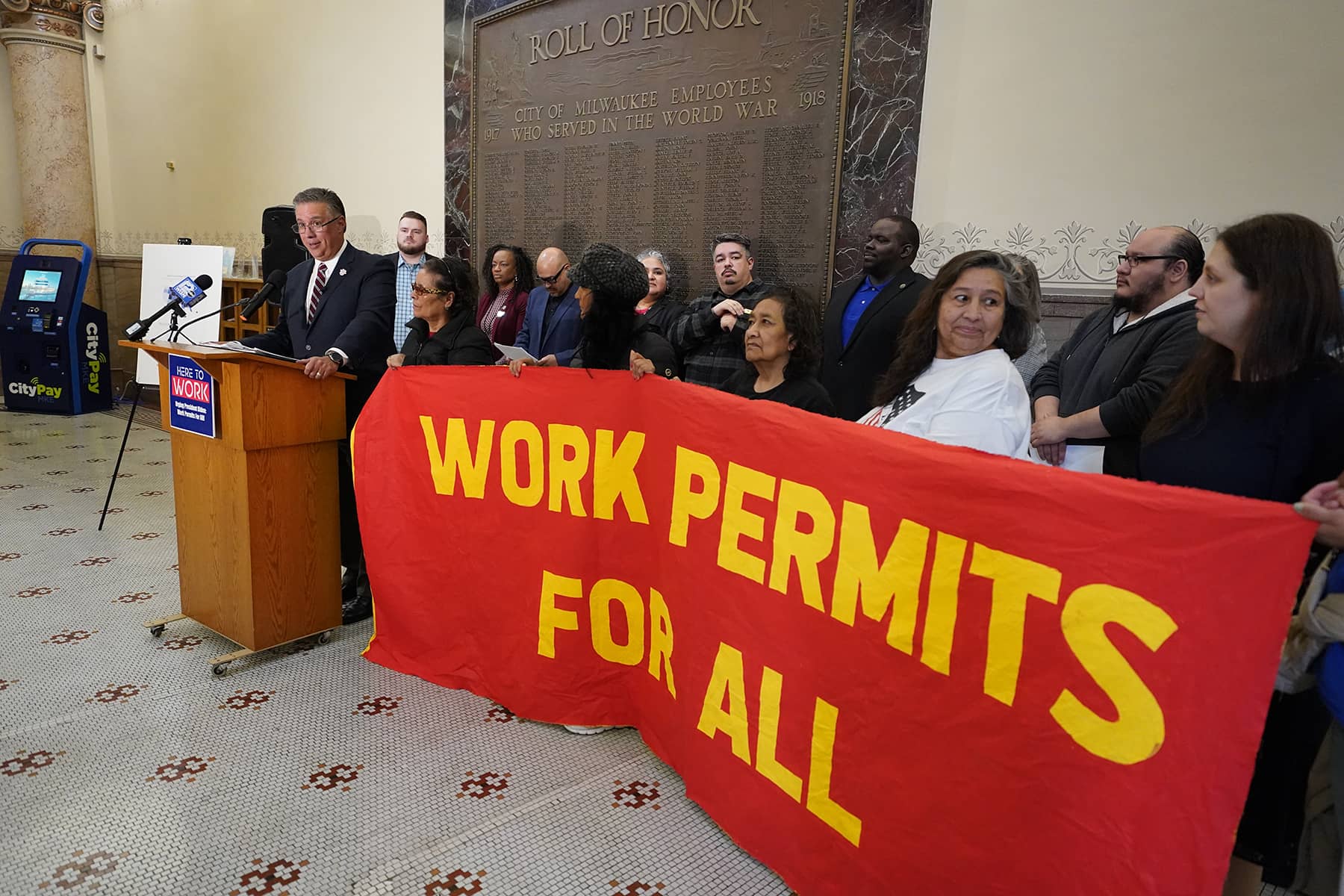
Leaders from business, labor, and advocacy groups joined elected officials at Milwaukee City Hall on May 22 and called on President Joe Biden to grant work authorization to long-term immigrant contributors in essential industries.
Organized by the American Business Immigration Coalition (ABIC), the press conference highlighted the critical labor shortages across the country and emphasized the potential economic benefits of immigrant labor. James O’Neill, Director of Legislative Affairs for ABIC, set the stage with stark statistics.
“The U.S. Chamber of Commerce estimates that even if we managed to get unemployment down to 0%, there would still be over 3 million open jobs across the country needing to be filled,” O’Neill said.
He pointed out that in Wisconsin alone, there are only 54 workers for every 100 open jobs, illustrating the severe workforce deficit.
O’Neill also emphasized that President Biden has the power to address the issue by granting work authorization to immigrants in essential sectors such as agriculture, hospitality, construction, and manufacturing.
“We need to be adding people to our workforce and we need to be doing it now,” said O’Neill.
As labor shortages continue to challenge the U.S. economy, immigration advocates are intensifying their calls for President Biden to grant work permits to long-term undocumented immigrants.
A coalition of migrant advocacy groups, known as “Here to Work,” is at the forefront of the push, urging the administration to allow the estimated 11 million undocumented immigrants who have lived in the U.S. for extended periods to apply for work permits. They assert that providing legal employment opportunities would help alleviate labor shortages and benefit the economy.
Darryl Morin, President of Forward Latino, highlighted the impact of labor shortages on businesses in Milwaukee, Wisconsin, and across the nation.
“The number one concern of every employer across the country is accessing the labor they need, not to grow their business, but to survive,” Morin said.
Morin said that major corporations were eager to invest in Wisconsin but have been hampered by the lack of available workforce. Morin also identified the immigrant community as a crucial part of the solution.
“These are the people we need. Those are the people who are going to not only help keep Wisconsin’s economy strong, but allow it to grow and prosper for each and every one of us,” said Morin.
The press conference featured several prominent speakers who shared their personal stories and advocated for policy changes.
Among them was José G. Pérez, the first Hispanic President of the Milwaukee City Council. Pérez drew parallels between historical and current anti-immigrant sentiments, urging the public to learn from the past.
“Our struggle, our cause did not begin yesterday and will not end tomorrow. We are all working to live today,” said Pérez.
Pérez added that in a few weeks the Republican National Convention would be held in Milwaukee, not far from City Hall at the Fiserv Forum. He said the RNC was expected to nominate a candidate who stood on a platform that degenerated immigrants and threatened their health and well-being, as well as their families.
“Their candidate will tell stories and try to sell a narrative for which, if you listen to carefully, is not different from the beliefs of the “Know Nothings” party, a nativist political movement in the 1850s,” said Pérez. “I’ve been in politics a while, but I still have enough optimism left in me to think that we can do better. So we’re asking the Democratic Party, President Biden, and Congress to step up and act now in supporting immigrant families here in Wisconsin and throughout the country.”
Juan Miguel Martinez, a Milwaukee County Board of Supervisors Member and former labor organizer, spoke about the harsh realities faced by undocumented workers. He stressed the importance of passing legislation that would grant work permits, which would provide stability and dignity to these workers.
“Undocumented workers work endless hours to make ends meet, and sometimes they still struggle,” said Martinez.
Despite growing pressure, the Biden administration has been hesitant to tackle the issue of work authorization for these undocumented immigrants, who do not fit into existing immigration categories. However, there have been discussions within the administration about implementing “parole in place” for spouses of U.S. citizens.
The initiative would grant a temporary immigration status that allows access to work permits and protection from deportation. Currently, an estimated 1.1 million people married to U.S. citizens are unable to secure a green card or citizenship due to legal constraints.
Pam Fendt, President of the Milwaukee Area Labor Council, highlighted the practical economic necessity of supporting immigrant workers.
“The labor movement is committed to fighting for a long overdue path to citizenship for all, all those whose labor helps our country and our state and our city to prosper,” Fendt said. Fendt underscored the importance of expanding rights and protections for immigrant workers to combat wage theft and workplace fatalities.
For many long-term undocumented immigrants, the process to obtain a work permit legally is often complicated and, in most cases, nonexistent.
The situation is markedly different for new arrivals. Many of the tens of thousands of migrants arriving at the U.S. border each month do not attempt to evade the U.S. Border Patrol after crossing without authorization.
Instead, they actively seek out the nearest uniformed agent to surrender and initiate a formal asylum claim. These asylum applicants, with their claims under review, can apply for an Employment Authorization Document, commonly known as a work permit.
Advocates argue that extending similar opportunities to long-term undocumented immigrants would provide a substantial workforce to meet the demands of the U.S. economy, which has been strained by labor shortages across various sectors. “We are calling on President Biden to take decisive action to support these hardworking individuals who contribute significantly to our communities,” says a spokesperson for Here to Work.
The Biden administration faces a complex decision: balancing the calls for immediate economic relief through immigration reform with the broader implications of such policy changes. As the debate continues, the lives and livelihoods of millions of undocumented immigrants hang in the balance, waiting for a resolution that could offer them the stability and dignity of legal employment.
The City Hall press conference also featured testimonials from individuals directly impacted by the current immigration policies. Megan, representing American Families United, shared her personal story of being separated from her undocumented spouse due to restrictive immigration laws.
“President Biden has the power under existing laws to reunite these families. Why hasn’t he?” she asked.
Ramon Moreno, a U.S. citizen and essential worker, has in past elections helped organize with Voces de la Frontera Action’s “Voceros por el Voto.” He said in a statement that “even though my mom is a U.S. citizen now, my father has worked and lived in Wisconsin for over 35 years and is still undocumented. We are following a process that has no end in sight. It’s taking too long and we still worry knowing his undocumented status puts us in a very precarious situation.”
The speakers issued calls to action, urging the public to contact their congressional representatives and express support for the “Here to Work” campaign. The message underscored the intersection of economic necessity and moral imperative, which advocated for a more inclusive approach to immigration that benefits both workers and the broader economy.
With Wisconsin poised to play a pivotal role in the upcoming 2024 presidential elections, the speeches from advocates offered a reminder of the intertwined fates of economic vitality and humane immigration policies.
“Immigrants are here to work. President Biden, you need to let them,” O’Neill added.
© Photo
Lee Matz

